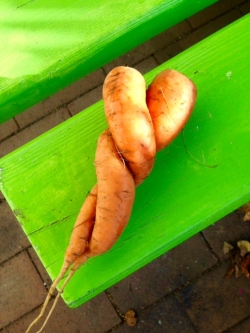A small look into the food-loving community ‘Københavns Fødevare Fællesskab’ (Copenhagen Food Community).
Since 2008, local and organically grown vegetables have been the focal point of the joint volunteer project Copenhagen Food Community. The idea of a Danish food community drew inspiration from a similar project in New York, and was formed by a group of young enthusiasts who saw a future in creating a better environment for people and nature.
The concept for the non-profit organization is simply to focus on organic, tasty, locally produced, sustainable, and season based food at affordable prices.
Copenhagen Food Community works from 10 basic principles designed to ensure sustainability in all stages of the working processes and the natural cycle they are part of. These 10 basic principles should help to ensure the organization a sustainable future:
- Grown and produced organically.
- Is grown locally
- Is season based
- Supports fair and direct trade
- Is environmentally friendly
- Projects and promoting knowledge about food and ecology
- Is financially sustainable and autonomous
- Is transparent and promotes reliability in all production and distribution
- Is close to the user and easily accessible
- Powered by a local working community
Copenhagen Food Community has 11 branch offices distributed around the different neighbourhoods in Copenhagen. In this way, members have easy access to their organic vegetables.
In fact, since launching in 2008, a total of 21 Food Communities blossomed throughout Denmark, and new communities are on the way.
From the ground to the table
Anyone can join the community and take advantage of the local production. A membership costs about 15 euros as a lump sum. Each week, members can buy a vegetable bag containing a mixture of seasonal delights.
Transport is a costly affair both environmentally and economically. Copenhagen Food Community has solved this problem based on sustainable thinking. Farmers drive their fruit and vegetables into a central warehouse, before the food is distributed to the branches by Copenhagen Food Community’s own drivers, using a car from the car sharing company "Let's go".
Farmers who deliver the goods to the central warehouse do it for free. In return, members from Copenhagen Food Community weed vegetables in the field. By doing so, Copenhagen Food Community is securing its principle of enhancing sustainability. The agreement supports the idea of shared finances, but it also helps to improve the bio-dynamic level in the cultivation of vegetables, because the work by hand replaces machining operations.
Responsible consumers
As part of Copenhagen Food Community’s voluntary concept, active members must contribute with three hours of work each month. The type of work varies, and can consist of for instance packing weekly vegetable bags, handing out bags to members, arrange for the administrative work. The need for voluntary hands is huge, as an average of 500 bags are packed every week!
One of the reasons that all members must lend a hand in the effort to secure fruits and vegetables of high quality at a affordable price is because Copenhagen Food Community wants to eliminate unnecessary intermediaries, and also provide transparency in the organization.
Joint working trips to farms serve the purpose of Copenhagen Food Community members to achieve greater understanding of the food they eat, while also trying to tie consumers and producers closer together.
Copenhagen Food Community is also some kind of social institution where people meet around a common passion; namely to eat greener, healthier and more sustainable.
Next week's bag contains: Potatoes, Dill, Carrots, Pak Choi, Red pray, Lettuce, Cucumber, Cherry and Strawberry.
The bag can be ordered here: https://medlem.kbhff.dk
An innovative wave
Small innovative projects like ‘Copenhagen Food Community’ are popping up all over Europe and every project is helping making our future more sustainable. The CASI project has provided a platform called CASIPIDEA where over 500 sustainable innovation initiatives and visions has been mapped. When exploring CASIPEDIA you will find similar projects/cases to ‘Copenhagen Food Community’ as inspiration to create sustainable innovation into the area of food production and distribution.
Find the cases and more inspiration here:
CASIPEDIA: https://www.futuresdiamond.com/casi2020/casipedia
Mossagården: https://www.futuresdiamond.com/casi2020/casipedia/cases/747
Farmama: https://www.futuresdiamond.com/casi2020/casipedia/cases/841
Relevant themes:
Resource efficiency, Environment, Climate action, Sustainable innovation
Relevant tags: Sustainability, Eco-innovation, Sustainable lifestyles, Circular economy
























